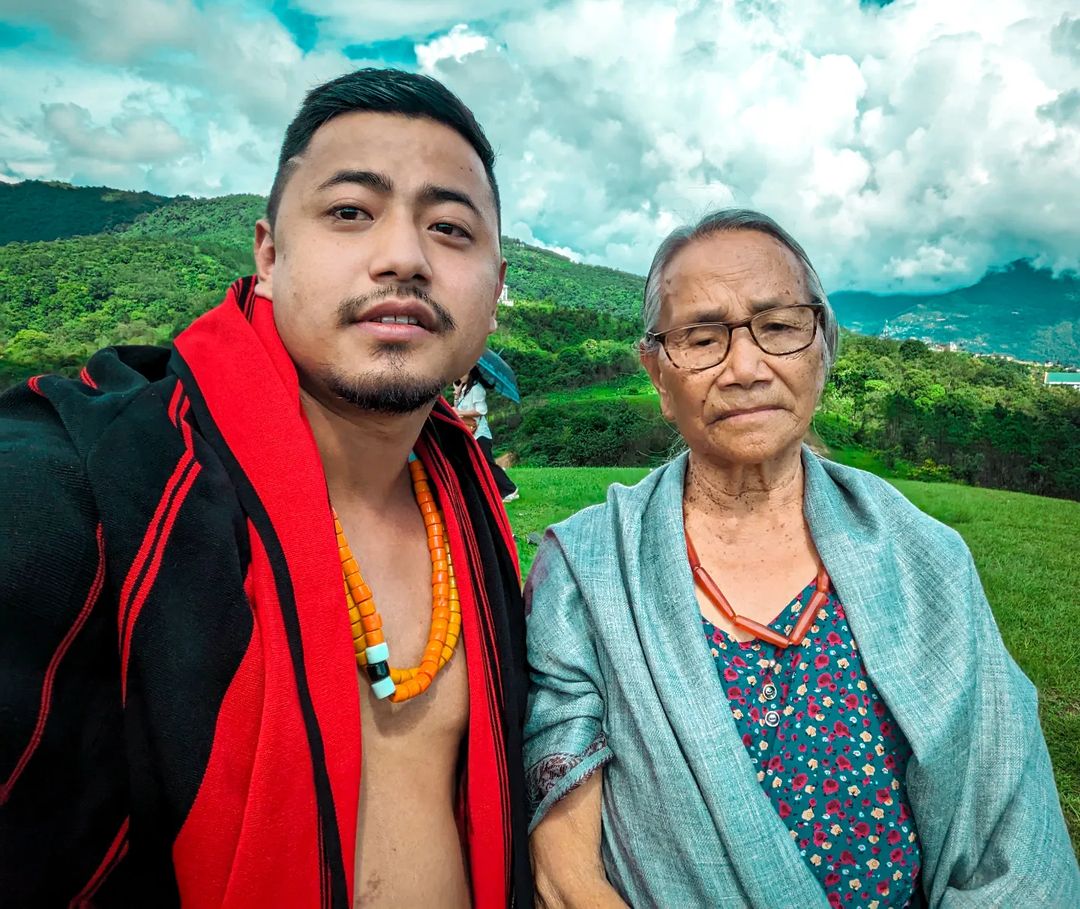[ad_1]
Mvüko Koza, a Kohima-based multilingual recording artist and songwriter, who popularly goes by Moko Koza, has by no means been afraid to specific his Naga identification and signify his individuals.
Standing on the forefront of Nagaland’s younger Hip Hop neighborhood, Moko makes use of his music and his distinctive storytelling talents as a medium to captivate audiences and seize the on a regular basis realities of a individuals dwelling in an typically forgotten nook of India.
Songs like ‘Naga Manu’ — which has racked up almost 1.9 million views on YouTube and impressed numerous reels on-line, ‘Boy From The Hills’, and ‘Tribally Savage’ are just some examples of how Moko expresses delight in his indigenous identification, talks in regards to the trials and tribulations of his individuals and tells their tales.
Belonging to the indigenous Chakhesang Naga tribe, Moko has develop into a major voice within the Northeast’s burgeoning Hip Hop scene. That is his story.

‘Hip Hop Simply Modified My Life’
Born on 15 June 1996 into “an everyday Christian household” in Kohima, Moko Koza grew up in a family the place conventional Naga music was an everyday function, alongside six siblings. Hip Hop got here into Moko’s life when he was barely 9 after listening to iconic rapper Eminem’s ‘8 Mile’ CD.
Talking to The Higher India, he remembers, “There have been others like 50 Cent and Ja-Rule who had been beefing on the time and placing out music, however the first Hip Hop artist I fell in love with was Eminem. His fearless storytelling, humour and the music itself made me fall in love with this style. The entire scene was scorching and I believe I found Hip Hop on the proper time.”
Rising up, Moko remembers how he was a timid and shy one who was scared to speak in entrance of individuals. Hip Hop helped him discover his voice. “Hip Hop was like a second father to me. It gave me the boldness to specific myself,” he remembers.
Moko was 14 when he wrote his first track and two years later composed and recorded his first track ‘Hearken to Your Coronary heart’ on a cell phone at his grandmother’s place. “The primary track I recorded was on a telephone. I transferred the audio to a pc and used a software program referred to as Digital DJ the place I needed to sync the music and audio with none mixing,” he reminisces.
Moreover writing songs and making music, Moko was additionally a very good pupil. After highschool, he acquired into the distinguished Christian Medical School (CMC) in Vellore, Tamil Nadu, to review drugs however turned down the chance to review there. He makes a reference to this occasion within the first verse of his newest single ‘Aji Kali’ which was launched earlier this month.
Why did he resolve to not pursue drugs from considered one of India’s main medical schools?
He says he didn’t need to go away Kohima. In hindsight, he argues that pursuing his commencement on the Kohima Science School turned out to be a “plus level” in serving to him mould his craft as a rapper and performer. “Given the calls for of medical faculty, perhaps if I had gone out to review there, I’d be a health care provider now as a substitute of a rapper,” he notes.
“Throughout faculty features, I’d at all times take the chance to get on stage and carry out as a result of I needed to eliminate stage fright. Within the years I spent in faculty, I’d at all times request my seniors to let me carry out on stage and they might give me an opportunity,” he provides.
In 2017, as he was coming in the direction of the top of his grasp’s diploma in Anthropology, he started performing in entrance of dwell audiences and incomes some cash from it.
“My household has at all times been supportive of my music. Throughout my faculty days, I by no means flunked out, introduced dangerous grades or acquired held up by ‘again papers’. That allowed my household to belief what I used to be doing with my life. On the identical time, I used to be making music,” he says.
“In faculty, making music began as a passion however quickly became a ardour. In 2017, I carried out in entrance of a dwell viewers and acquired paid for the very first time. That is how I realised that I can pursue music as knowledgeable profession as a substitute of learning, giving exams, and pursuing authorities jobs,” he provides.
However for any artist beginning out, it’s tough to pay for studio periods after they can’t afford it. Early on, Moko would borrow cash from his mom to pay for these periods as a result of he didn’t have a correct recording studio at dwelling.
Infinity Inc.
Proper after incomes his grasp’s diploma in (Bodily) Anthropology in 2018, nevertheless, he acquired a name from Asalie Peseyie, the founding father of Dimapur-based file label, Infinity Inc.
“I first heard of Moko Koza again in late 2017 after listening to a Nagamese observe he launched referred to as ‘Puisa’. Once I met him for the primary time in 2018, I discovered a totally devoted and humble particular person — two traits which have remained fixed since then,” says Asalie.
In actual fact, Asalie was a rapper within the early 2000s and a pioneer of Hip Hop in Nagaland. However annoyed by the dearth of a help system, he traded in his mic for different pursuits.
“Infinity Inc. stemmed from my brief stint as a rapper earlier within the 2000s. The dearth of a help system made it nearly unimaginable for native artists to interrupt out. In fact, social media was not even round on the time. These experiences impressed me to create Infinity Inc. — a springboard for upcoming Naga artists to succeed in the degrees that they’re able to doing. At current, we now have 4 artists, three DJs and two producers who’re signed to our label,” he says.
“Ever since I began Infinity Inc. in February 2018, our precedence was to signal Moko as an artist. I’ve at all times appreciated that his artwork stems from his love of his tradition and folks and is marked by originality — a uncommon commodity in artists nowadays,” provides Asalie.
In the meantime, Moko remembers the decision he acquired from Asalie following his post-graduation.
“Over the decision, Assalie advised me how they needed to signal me as an artist. With none second ideas, I signed with them as a result of I needed to pursue music. Becoming a member of Infinity Inc. gave me entry to knowledgeable studio with in-house producers and sound engineers who would assist me make the music I needed. From struggling early on to place out music and asking my mom for cash to pay for a studio session, right now I’ve entry to the instruments I want,” says Moko.
Convincing his dad and mom wasn’t laborious. “Once I advised them that I’m going with music full-time and shifting to Dimapur, they stated that I used to be sufficiently old to make my selections,” he says.

‘Naga Manu’
Ase emi ekta Naga Manu chokora (First off, I’m a Naga)
D-Block, Kohima city jonom hoa laga jaga (D-Block, Kohima city was the place I used to be born)
Ama laga peth para ula bole time te (As I got here out from my mom’s womb)
Naga Manu khoom tu bukhi kena olaisheh (The blood of a Naga has been in me ever since)
Earlier than releasing ‘Naga Manu’ in August 2022, Moko Koza caught the ears of Hip Hop aficionados from across the nation together with his battle rap songs and cyphers marked by fascinating wordplay, movement and cadence. However ‘Naga Manu’ actually put him on the map. The inspiration got here from his reminiscence of ‘Puisa’, the primary Nagamese track he put out, and the nice reception it acquired on-line.
‘Puisa’, which implies cash in Nagamese, displays on how the youth are exhausted by systemic corruption that has troubled Nagaland for many years. Nagamese is the generally accepted lingua franca in a state with many tribes which have their very own indigenous languages.
“Because the response to Puisa was good, I thought of making extra Nagamese songs. Writing and rapping in Nagamese and different dialects has launched me to an entire new viewers, significantly the older generations. In the case of ‘Naga Manu’, I recognised that not everybody has the voice to talk for the neighborhood. As an artist, I’ve that platform. So, I actually needed to handle some key social points in Nagaland like alcohol prohibition,” explains Moko.
“But when we discuss one thing very critical, individuals don’t often hear. So I considered bringing in some humour so that folks would hear. This helped me set up the idea of the track,” he provides.
The track uncovered an entire new viewers to Moko’s music and supplied some fascinating insights into what’s going on in Nagaland, significantly with regards to prohibition. Within the track, for instance, Moko displays on how alcohol is prohibited in Nagaland however everybody is aware of the place to search out it and the way that unlawful liquor comes from Assam at the price of the native economic system.
“I actually needed to handle the hypocrisy behind alcohol prohibition in Nagaland. Many in Nagaland are asking for prohibition to be lifted, however the church and different civil society teams are coming in robust to oppose it. Satirically, I’ve seen the sons of church members getting drunk,” he notes.
“The humorous factor is that the track has anti-government undertones, however at sure features the place I carried out the track in entrance of presidency officers, they appeared to get pleasure from it,” he provides.
However the track additionally makes clear references to the delight Moko feels in his Naga identification and the prejudices that folks in mainland Indians harbour in opposition to Nagas, together with their meals habits.
Bahar mannu ki ki kobi etu moi najane (Let individuals decide us due to our meals habits and our methods)
Moi ki khai taikhan la ki jai (What I eat and the way I look is none of their enterprise)
Matha kati kena ahya manu asede (We got here from a era of headhunters)
Muikhan Naga manu khan bi kmoti nohoi de (We’re all proud to be referred to as a Naga)
‘Boy From The Hills’
In ‘Boy From The Hills’, which was launched in September 2023, Moko Koza celebrates his Naga ancestry and speaks of rising from “the soil that was stained by the armies”.
The track attracts inspiration from the tales his grandmother advised him in regards to the horrors visited upon the Naga individuals throughout World Conflict II when the Japanese launched their U-go offensive into India, which led to the epic Battle of Kohima in 1944. Because the introduction of the music video notes, “An occasion that modified the course of world historical past. An occasion that examined the resilience of the Nagas. An occasion that has been famously dubbed ‘The Stalingrad of the East’.”
“Once we had been kids, my grandma would inform us tales about how she grew up throughout World Conflict II whereas the British and Japanese troopers had been combating one another. Most of our tales are handed down orally from one era to the following. However on this course of, they get modified, and typically, consequently, the actual story doesn’t exist anymore. On this track, I actually needed to get the actual story recorded in order that it stays on endlessly and helps the youthful era perceive what actually occurred,” he says.
“Additionally, as an artist, I additionally needed to experiment with new sounds, taking inspiration from our people traditions. I attempted to experiment with it whereas additionally taking inspiration from my grandma who not too long ago advised me extra about these occasions whereas I used to be visiting her,” he provides.
A standout function of the track is the hook (refrain), which Moko describes as “a lullaby that was sung to us as kids by our grandparents.” Sung in Tenyidie, an indigenous language spoken by the Chakhesang Naga tribe, it brings a sure serenity amidst the chaos.
“There are two verses within the track, that are very chaotic — speaking in regards to the warfare and what our individuals went by. So I needed the refrain to be very soothing and calm. When the refrain is available in after the primary verse, it’s like placing the newborn to sleep. You are feeling that calmness. After which the second verse comes wherein talks in regards to the warfare in opposition to the Japanese, which once more could be very violent and chaotic. That is as soon as once more adopted by the refrain and the calmness,” explains Moko.
“Initially, I didn’t know what to say within the refrain. It so occurred that I used to be watching a brief documentary about Naga people music once I heard that lullaby. This was good for my track. After this, I acquired in contact with my good friend Nourhe Zatsu who sang the refrain,” he provides.
“Like Moko’s grandmother who spoke of her expertise of the warfare in Khezhakeno village in Phek district, my late maternal grandmother additionally used to relate tales of when the Japanese troops entered her village of Jakhama. It was a traumatic time of their lives,” explains Asalie.

“I believe Moko does a terrific job of being musically related with trendy types but on the identical time staying linked to his roots with the content material of his songs,” he provides.
And this function additionally seems in songs like ‘Tribally Savage’ which was launched final yr.
On the finish of the music video, Moko makes a reference to the occasions of 4 December, 2021, when Indian safety forces killed 14 harmless civilians from Oting village in Mon district, mistaking them for armed militants. He goes on to make a plea for repealing the draconian Armed Forces (Particular Powers) Act (AFSPA), which supplies Indian safety forces immunity to make use of pressure “even to the extent of inflicting loss of life”. In previous interviews, Moko has spoken of wanting to finish this cycle of violence which has been occurring for greater than 5 many years.
Regardless of a long-standing ceasefire between the Indian state and armed teams searching for a separate homeland for the Naga individuals, core political disputes stand unresolved.
Forsaking a legacy
“Once I was beginning out, the scene was very quiet. The rappers earlier than us had their very own time after which life occurred for them. What I discovered early on was that the older era wasn’t very receptive to Hip Hop music. They had been largely into rock music and your outdated classics. However once I made songs in Nagamese and different native dialects, each the youth and the older era began taking discover of rap music and having fun with it. By no means in my life, I believed that Naga individuals older than 50 would recognise me, however it’s the place we are actually,” says Moko.
Asalie additionally hails the influence Moko Koza has made in his profession to this point. “With an in depth connection to his roots and using multilingual rap, he has linked with the lots from little youngsters to elders in distant villages singing his songs. I nonetheless really feel Moko doesn’t get the due recognition he deserves though he’s clearly acknowledged as one of many largest Naga artists presently.”
(Edited by Pranita Bhat; Photos courtesy Moko Koza/Instagram)
[ad_2]



